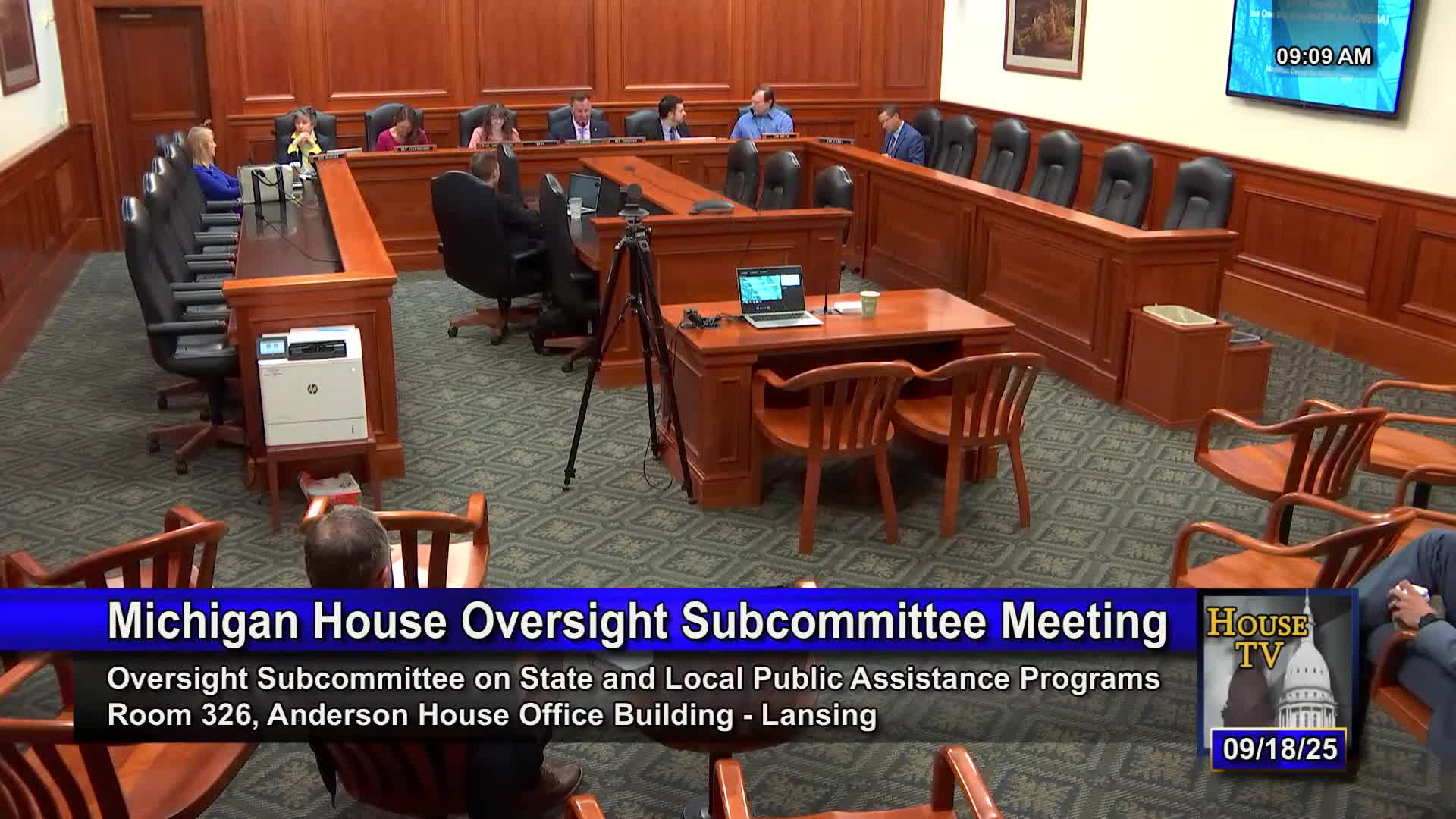Michigan Oversight Subcommittee Reviews SNAP Error Rates and New Penalties
September 19, 2025 | 2025 House Legislature MI, Michigan
This article was created by AI summarizing key points discussed. AI makes mistakes, so for full details and context, please refer to the video of the full meeting. Please report any errors so we can fix them. Report an error »

The Oversight Subcommittee on State and Local Public Assistance Programs convened on September 18, 2025, to address critical issues surrounding the Supplemental Nutrition Assistance Program (SNAP) in Michigan. The meeting, led by Chair Wolford, highlighted significant concerns regarding the state's SNAP error rates and the financial implications of these errors for taxpayers.
Adam Stacy from the Mackinac Center for Public Policy presented an educational overview of the SNAP program, emphasizing that Michigan currently faces a SNAP error rate of 9.53%. This high error rate is projected to cost taxpayers an additional $300 million next year, raising alarms about the efficiency of the state's public assistance administration. Stacy noted that approximately 1.5 million Michiganders, or one in seven residents, rely on SNAP benefits, a figure that has fluctuated due to economic conditions and changes in federal eligibility standards.
The discussion centered on the "1 Big Beautiful Bill" (OBAA), which aims to address these error rates and implement new penalties for states with high rates of improper payments. Stacy explained that improper payments include both overpayments, where recipients receive more assistance than they are eligible for, and underpayments, where they receive less. The implications of these errors are significant, not only for the state budget but also for the individuals and families who depend on these vital resources.
The meeting underscored the ongoing challenges faced by Michigan's public assistance programs, particularly in the wake of economic shifts and the lingering effects of the pandemic. As the committee continues to explore solutions, the focus remains on improving the accuracy and efficiency of SNAP to better serve the community and protect taxpayer interests.
In conclusion, the Oversight Subcommittee's discussions reflect a critical juncture for Michigan's public assistance programs, with potential reforms on the horizon aimed at reducing error rates and enhancing program integrity. The committee's next steps will be crucial in determining how effectively these challenges can be addressed in the coming months.
Adam Stacy from the Mackinac Center for Public Policy presented an educational overview of the SNAP program, emphasizing that Michigan currently faces a SNAP error rate of 9.53%. This high error rate is projected to cost taxpayers an additional $300 million next year, raising alarms about the efficiency of the state's public assistance administration. Stacy noted that approximately 1.5 million Michiganders, or one in seven residents, rely on SNAP benefits, a figure that has fluctuated due to economic conditions and changes in federal eligibility standards.
The discussion centered on the "1 Big Beautiful Bill" (OBAA), which aims to address these error rates and implement new penalties for states with high rates of improper payments. Stacy explained that improper payments include both overpayments, where recipients receive more assistance than they are eligible for, and underpayments, where they receive less. The implications of these errors are significant, not only for the state budget but also for the individuals and families who depend on these vital resources.
The meeting underscored the ongoing challenges faced by Michigan's public assistance programs, particularly in the wake of economic shifts and the lingering effects of the pandemic. As the committee continues to explore solutions, the focus remains on improving the accuracy and efficiency of SNAP to better serve the community and protect taxpayer interests.
In conclusion, the Oversight Subcommittee's discussions reflect a critical juncture for Michigan's public assistance programs, with potential reforms on the horizon aimed at reducing error rates and enhancing program integrity. The committee's next steps will be crucial in determining how effectively these challenges can be addressed in the coming months.
View full meeting
This article is based on a recent meeting—watch the full video and explore the complete transcript for deeper insights into the discussion.
View full meeting
